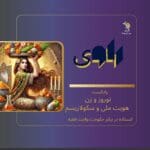
This episode of Ravi–HamAva explores the relationship between Nowruz and Iranian women. Nowruz, an ancient celebration thousands of years old, has endured through the rise and fall of empires, remaining a living tradition deeply woven into the cultural fabric of Iran.
More than just a holiday, Nowruz serves as a shared language and a chain of solidarity among all Iranians, regardless of ethnicity, belief, or gender.Throughout history, and especially during the past 46 years under the Islamic Republic, various efforts have been made to erase this deeply rooted cultural heritage. The regime has used suppression and propaganda to diminish Iranian identity and replace it with religious dogma.
In this episode, political analysts Nazila Golestan and Sahar Nasseri, theater actress and researcher Sahar Rezvani, and linguist Arsalan Kohnamooipour reflect on the regime’s attempts to “Islamicize” Nowruz, the cultural and political significance of preserving national traditions, and the central role women have played in keeping this secular and inclusive heritage alive.Together, the guests examine how Nowruz remains not just a celebration, but a powerful expression of resistance, cultural resilience, and unity, especially in a nation where identity and freedom continue to be contested.
The Ravi–HamAva podcast series is dedicated to fostering national dialogue around universal values: democracy, secular governance, human rights, sexual equality, and the preservation of Iran’s territorial integrity.Within this framework, it envisions a free and dignified Iran for all citizens—regardless of belief, opinion, sexuality, ethnicity, or background.
“A government of the people, by the people, for the people.”
